Maryland Appeals Court Forces Cops to Pay Camera Tickets
The Maryland Court of Appeals ruled on January 24 that officers who received speed camera tickets while driving police cars on duty must pay the $40 fine. Montgomery County Officers Dean Cates, Randy Kucsan, Bill Tran, and Dana Way protested after their department reissued citations in their names in 2008. They were found guilty in district court, but a circuit court judge dismissed the charges on the grounds that the officers were denied their due process rights. The state appealed, hoping the court would rule that police officers are not entitled to due process before liability for a speed camera ticket is transferred.
Under county policy, speed camera tickets are re-issued to the policemen, paramedics and firemen who were behind the wheel of police cars, ambulances and fire trucks if the emergency lights on the vehicles were not visibly activated in the photograph. The officers complained that their sergeant would ask them weeks or months after an alleged offense to explain why they were speeding.
State Lawmakers Rally to Oppose Photo Enforcement
In the face on an onslaught by the insurance and traffic camera lobbyists to convince the public that red light cameras and speed cameras save lives, state lawmakers around the country are fighting back. Representatives in Florida, Iowa, Missouri, Washington and Virginia from both the Democratic and Republican parties have noted the lack of effectiveness of automated ticketing machines in their respective states and have proposed severe restrictions or outright bans on their use. Later today, the Virginia House Militia, Police and Public Safety Committee will discuss legislation that places a moratorium on further red light camera deployment in the commonwealth.
“No locality shall implement or expand a traffic light signal violation monitoring system on or after July 1, 2011,” House Bill 2327 states.
North Carolina Appeals Court Rules in Death Caused by Red Light Camera
The North Carolina Appeals on Monday exonerated the owners of the red light camera that killed a twenty-four-year-old. The heavy device had fallen onto the Ford Mustang in which Elizabeth May was a passenger on May 17, 2007. May’s family sued the city of Fayetteville, where the camera was located, and Affiliated Computer Services (ACS), the for-profit company that owns and operates the red light camera program.
Opinion: Flaws in Insurance Institute Traffic Camera Study, Part 2
The Insurance Institute for Highway Safety spent all of yesterday touting its report on the effectiveness on red light cameras as if it were the most “comprehensive” study available on the topic. The group emphasized the effects cameras would have had on one hundred of America’s largest cities, but the report itself only looked at accident numbers in fourteen out of the 500 jurisdictions that have active photo ticketing programs. Industry researchers did not even know how many red light cameras were in use in the locations studied.
“Attempts were made to obtain historical information on the number of red light cameras in the study cities, but information on the scope of red light programs could not be obtained for many of the cities,” the IIHS study explained (page 9).
Porsche And Volkswagen Will Stay Separate For A While
Impatient souls who already count Porsche and Volkswagen as one will have to exercise restraint for a while. The planned amalgamation of the Wolfsburg monster with the racy shop from Zuffenhausen can drag on for a while, reports Automobilwoche [sub]. The reason: Pricks Lawyers.
License Plate Scanner Obsoletes Meter Maid
License plate recognition, a technology that helps police track down stolen cars, that assists shopping malls in guiding customers to their cars, and that raises privacy concerns when doing so, will be used in Manly County, in Australia’s New South Wales, to combat illegal parking in local streets.
Washington: Four Cities Consider Red Light Camera Referendum
Residents in four cities in Washington state may opt for a ballot vote to ban the use of red light cameras and speed cameras. This week activists launched a coordinated effort to place the future of photo enforcement to a vote of the people in Bellingham, Longview, Monroe and Wenatchee. Each local group is following the battle plan established in Mukilteo where 71 percent of voters last year ousted automated enforcement.
US Appeals Court Overturns Conviction Based on a Lie
The US Court of Appeal for the Eighth Circuit on Monday overturned the sentence of a man convicted based on questionable testimony about a traffic stop. Despite clear evidence that a police officer contradicted himself regarding the reason he pulled over Ronald Prokupek on February 29, 2008, a magistrate in Nebraska and a federal district court judge still found him guilty. The three-judge appellate panel strongly disagreed, noting the rarity of the situation where it was forced to declare the lower court judges guilty of “clear error” in their decisions.
Maryland: Optotraffic Cameras Shown To Be Inaccurate
The accuracy of the speed cameras deployed by Forest Heights on Indian Head Highway (State Highway 210) has been questioned by local residents were claiming innocent drivers were being ticketed. Citation photos appear to show many cases that speed cameras in Forest Heights cited vehicles for speeds far in excess of the speeds the citation images indicate.
First, Forest Height’s speed cameras are a proprietary design by Optotraffic, a division of Sigma Space Corporation. These cameras are neither radar (like most cameras used in Montgomery County) nor are they exactly like traditional police LIDAR. Technical specifications for Optotraffic’s cameras can be viewed here.
To simplify it, Optotraffic’s cameras work by taking two laser sensors into each lane of traffic. The device “records the time when each sensor detected the object.” The speed is then calculated as “Measured Speed = Distance/Time.” If a vehicle is determined to be exceeding a predefined threshold speed, a short distance/period of time later the device snaps two photos a fraction of a second apart.
So why would someone think the devices are inaccurate? Well, because many people have gotten tickets from Forest Heights for speeds they know they were not traveling at. Some of them performed their own distance/time calculations from the citation images which produced an extremely different speed than what they were cited for.
How Safe Is Your State To Drive In?
Alberta, Canada Cancels 141,729 Photo Tickets
Unable to verify the accuracy of certain speed camera readings, the government of Alberta, Canada announced Monday that it would issue full refunds to motorists. Doubt surrounds speeding citations issued from any of the forty-seven red light camera intersections in the city of Edmonton under a program known as “speed on green.” The refunds cover automated tickets mailed between November 2009 and January 14, 2011.
“This is the right action to take,” Minister of Justice and Attorney General Alison Redford said in a statement. “Our first concern is the fair administration of justice, and we cannot proceed with legal action when there is doubt about the accuracy of the city’s speed on green ticket technology.”
Tennessee Tackles Traffic Cameras Again
The Tennessee General Assembly, which in past sessions has endorsed the use of speed cameras and red light cameras, is preparing once more to either expand or restrict their use. Bills introduced earlier this month provide the foundation for action that frequently takes a different turn after committee consideration.
Lobbyists for municipalities that use automated ticketing machines have a strong hold over the General Assembly and its committees. In 2008, municipalities joined forces with the camera industry to push through a measure authorizing photo ticketing. To deal with vocal opponents to the idea, then-state Senator Tim Burchett (R-Knoxville) drafted the bill in such a way that its wording appeared to be a ban on cameras. Similarly, attempts at placing limitations on camera use last year were watered down in the committee process to the point where the remaining “limits” merely reflected existing practices.
California: Another Red Light Camera Referendum Possible
The city council in Murrieta, California voted Tuesday to expand red light camera ticketing, and residents are not happy. Officials approved a three-year photo ticketing contract extension with American Traffic Solutions (ATS) and directed the private company to set up 24-hour video surveillance at each intersection. Local activists want to force a referendum onto the ballot to let residents decide whether those devices should be unplugged.
“I’m just so fed up with this,” Diana Serafin told TheNewspaper in an interview. “It’s the $500 fine and big brother watching you. To make an intersection safe, you need longer yellows and a longer all-red period. The city says they want the intersection safe, but cameras cause more rear end accidents. So I’m fighting back.”
Texas: Red Light Cameras Boost League City Accidents
Red light cameras in League City, Texas have failed to reduce accidents according to preliminary data provided by the Texas Department of Transportation (TxDOT). Since October 2009, the Australian firm Redflex Traffic Systems has issued citations at three intersections along FM 518. Local activist Byron Schirmbeck analyzed TxDOT reports and found the number of accidents at these locations increased after camera installation. In November, Schirmbeck led the November successful referendum effort twenty miles away in Baytown where voters rejected the use of automated ticketing machines.
Traffic Camera Companies Renew Push in Indiana
The residents of six cities with a combined population of over 2.7 million voted last year to outlaw the use of automated ticketing machines on their streets. The photo enforcement industry is now working overtime to make up for lost ground by expanding operations into states where neither red light cameras nor speed cameras have been well received. Lobbyists are hopeful that Indiana could be the next state to reconsider.
Toyota Trials Start In 2013
California Appellate Courts Continue to Toss Red Light Camera Tickets
California courts continue to find the evidence provided by photo enforcement citations to be lacking. In both Orange, and San Mateo Counties, appellate division judges found the images presented in court by private vendors to be inadmissible hearsay. Late last month, Kern County joined the growing number of jurisdictions troubled by the quality of traffic camera evidence packages.
Delaware Court Rules Against GPS Motorist Tracking
A Delaware superior court judge took a stand last month against the warrantless police use of GPS devices to record the movements of drivers. Judge Jan R. Jurden issued her ruling in the case of Michael D. Holden who was arrested on drug charges in February 2010 as a result of information obtained from a tracking device.
Toyota Whistleblower Dimitrios Biller Slapped With $2.6m Judgement
New Jersey: Camera Town Caught With Short Yellow Times
The first southern New Jersey municipality to issue a red light camera ticket admitted last week that it issued 12,000 tickets worth $1 million at an intersection where the yellow light time was illegally short. At the intersection of William Dalton Drive and Delsea Drive, motorists were given just 3 seconds of yellow warning before the camera began snapping — as opposed to the 4 seconds mandated by state regulations. Mike Koestler, the former mayor of Harrison Township, caught the error after receiving a ticket.
Texas Town Nears Referendum to Ban Red Light Cameras
Port Lavaca, Texas residents want the opportunity to vote on the future of red light cameras in the Gulf Coast city of 12,000. Activists who formed the group Port Lavaca Citizens Against Red Light Cameras circulated a petition that would force an up or down vote regarding camera use onto the ballot. Under the city’s charter amendment rules, the group needed to secure 289 signatures. It collected 519, plus another one thousand signatures of support from motorists in the surrounding community.
53,000 Apply On The First Day Of Beijing's Car Rationing
So. Yesterday, Jan 1, was the first day of the grand car rationing in Beijing, China. From now on out, only 20,000 new vehicles per month are allowed onto Beijing’s roads. (If you trade old for new, this rule doesn’t apply.) And what did Beijingers do? Take a taxi? The subway? No, they swamped the system.
Chrysler Moves To Relocate Reinstated Dealers
Chrysler’s bailout-era dealer cull has ended up being something of a nightmare, with a number of dealers successfully fighting for reinstatement as federal investigators look into possible criminal wrongdoing. And whereas GM has basically rolled back much of its dealer cull, Chrysler has consistently used arbitrary calculi for closing dealers and has resisted giving dealers the opportunity to reclaim their franchises. Now, the dealers that have won reinstatement in congressionally-mandated arbitration hearings are facing a new threat: relocation. Automotive News [sub] reports that Chrysler’s method of dealing with reinstated dealers is to force them to relocate wherever Chrysler wants them to go. Chrysler has filed a request in a Michigan District Court, asking for the ability to relocate some 20 dealers in 6 Midwestern states, a move it says it must undertake in order to protect its non-culled dealers. But, having picked the winners and losers among its dealers only to see some of them reinstated, shouldn’t these reinstated dealers be afforded the same rights as the dealers who weren’t culled in the first place?
UK: Speed Camera Penalties Adjusted to Meet Revenue Goals
Speed camera operators in the UK are looking to hike costs for “educational courses” and redeploy cameras to more lucrative locations to address a growing budget deficit. The options for the Thames Valley Safer Roads Partnership were discussed in an August 11 strategy meeting, the minutes for which were obtained from a freedom of information request. The partnership consists of local police agencies, local council members, the courts and the staff who run the speed cameras themselves.
DC: Bogus Breathalyzer Results May Go Back a Decade
Motorists in Washington, DC may have been falsely accused of driving under the influence of alcohol (DUI) for more than a decade as a result of faulty “Intoxilyzer” breath testing equipment. Whistleblower Ilmar Paegle, a veteran police officer now working as a contract employee for the District Department of Transportation, argued in a memorandum to the city’s attorney general that the breath testing machines have not been properly calibrated since 2000, as first reported by WTTG-TV.
To date, the District has only admitted to bogus breathalyzer results taken between September 2008 and February 4, 2010. Of 1100 cases prosecuted in that period, 300 were convicted based on evidence provided by faulty machines.
Class Action Lawsuit Filed Against South Carolina Speed Trap
A federal class action lawsuit was filed Monday against the notorious speed camera trap in Ridgeland, South Carolina. Three law firms teamed up to make the case against the town’s outspoken mayor, Gary Hodges, members of “the local police department and iTraffic, the private company that operates the cameras on Interstate 95. The case was filed on behalf of residents of Greer, South Carolina; and Dunnellon and Kissimmee, Florida.
EVs Get A Big Honking Bill
This weekend’s homage to the car’s electrification, celebrating deliveries of the Leaf and the Volt to normal civilians, in addition to a whole fleet of electric THINK cars delivered to the State of Indiana, would be incomplete without mentioning that EVs can be a menace to society. These things are so quiet – that they creep up on you – just like that.
Cleveland Cameras Lose Third Apellate Case
In the space of just over four weeks, Cleveland, Ohio has lost three appellate-level cases over its photo enforcement program. On November 10, a federal appeals court panel shot down the city’s attempt to block a class action lawsuit by drivers of leased vehicles who received traffic camera ticket ( view opinion). On Monday, a state appeals court panel came to the same conclusion, finding it likely that the city unjustly enriched itself with photo tickets ( view opinion). Yesterday, a new three-judge panel of the the Ohio Court of Appeals for the Eighth Appellate District threw out a speed camera tickets on the grounds that Cleveland had ignored state law.
South Carolina: Legal Challenge to Renegade Speed Trap Town
Class action attorneys have set their sights on a South Carolina town that set up a freeway speed camera in defiance of state law. Since August, the town of Ridgeland has allowed the private company iTraffic to operate a speed camera system to mail tickets worth $133 to $300 each to the owners of vehicles photographed as they pass through a tiny stretch of Interstate 95. The fully automated system is housed in a recreational vehicle that is usually concealed behind a bridge. When state legislators heard of the town’s plan, they unanimously enacted a law to prohibit the use of speed cameras ( view law).
The Republic Strikes Back: Ford Cologne Raided By Police, Managers Under Suspicion Of Corruption
Remember the Schadenfreude when the Department of Justice shook down Daimler for $185 million for corruption allegedly perpetrated in U.S. jurisdictions such as Russia, China, Turkey, Egypt, Nigeria, Iraq, Turkmenistan, and a host of others? To add insult to imbursements, Daimler even had to endure former FBI director and Lewinsky-sperm-on-blue-dress investigator Louis Freeh as anti-corruption compliance officer. In the bargain, the NYSE lost Daimler as a listing, because no NYSE listing, no more SEC probes. Everybody knows that these inducements are quite common in the industry. As evidenced by a massive raid involving around 100 police officers. They descended today on Ford’s German plants, on an unidentified company in Leverkusen and on the private homes of Ford employees.
Maryland: Federal Court Overrules Window Crack Traffic Stop
A federal judge last week overturned the result of a traffic stop in Baltimore, Maryland after the reason for the stop was found to be bogus. On January 26 at around 1:30pm, Baltimore City Police Officers Jimmy Shetterly, Frank Schneider, and Manuel Moro ordered a white Ford Crown Victoria with tinted windows to pull over while driving on Pennsylvania Avenue near Mosher Street. As part of the Central District Operations Unit, the officers saw their mission as “proactive crime fighting” and instead of waiting for calls, their mission was to go and find a crime. The officer sitting in the back seat of the patrol car found one in the form of a claimed vehicle defect.
Ohio: State Court Green Lights Traffic Camera Case
The red light camera program in Cleveland, Ohio faces serious legal trouble as the state’s second-highest court ruled Thursday that a class action lawsuit could proceed. In its decision, a three-judge panel of the Ohio Court of Appeals for the Eighth Appellate District overturned a county court ruling that had blocked a class action challenge to the city’s issuance of photo tickets to the drivers of leased vehicles. The appellate court insisted that the case had merit as did a federal appeals court in a separate case decision over Cleveland’s automated ticketing machines handed down last month ( view ruling).
Texas: Federal Judge Lets Houston Defend Camera Referendum
A federal judge sided yesterday with a traffic camera company by blocking anti-red light camera referendum sponsors in Houston, Texas from participating in an ongoing legal challenge. US District Court Judge Lynn N. Hughes will decide whether the November 2 vote of Houstonians against traffic cameras should be nullified. Hughes will now make his decision based solely on the arguments presented by supporters of photo enforcement — the city of Houston and American Traffic Solutions (ATS).
Missouri Legislature to Tackle Photo Ticketing Issue
Opposing factions in the Missouri General Assembly have emerged ready either to authorize or prohibit the further use of automated ticketing machines in the state. One one side, state Representative Tim Meadows (D-Imperial) has been wined and dined by lobbyists for the photo ticketing industry and, in return, has filed legislation specially crafted to expand the use of speed cameras while appearing to be a “limitation” on their use.
Auto Journalists Beware: Fiat Sues Over Negative Review
The relationship between automakers and automotive journalists can be extremely difficult, as automakers often hold access to cars hostage based on a journalist’s coverage of them. If, as an automotive journalist, you like every car you drive, the world is your oyster. Automakers invite you to every launch, PR guys gaze longingly into your eyes, and all is right with the world. If, on the other hand, you write negatively about a car, you can find yourself watching the gravy train pull out of the station without you… or, as it turns out, you could even be sued. At least in Italy.
Carscoop reports that Fiat is suing the Italian TV show AnnoZero for “defamatory” remarks about the Alfa Romeo MiTo Quadrifoglio, after the program asserted “the overall technical inferiority of the Alfa Romeo MiTo” in comparison to the MINI Cooper S and Citroen DS3 THP. The details of the case are sketchy, but you can find Fiat’s press release on the matter after the jump.
Canada: City Officials Remain Secretive About Photo Ticket Program
A watchdog group last week filed a complaint with Canada’s privacy commissioner and the Manitoba Ombudsman’s Office over the city of Winnipeg’s refusal to release data about its photo enforcement efforts. Over the past five months, WiseUpWinnipeg had filed three separate requests for basic information under under a freedom of information law known as FIPPA, but city officials have refused to comply.
Two More California Cities Reject Red Light Cameras
Red light cameras are nowhere near as popular as they once were with Golden State municipalities. Loma Linda and Whittier became the most recent examples of California cities unplugging their automated ticketing machines after noting that the devices both failed to reduce accidents and generate the promised amounts of revenue.
Legal Scholars: Bailout Unlawful
The bailout of GM and Chrysler was nothing compared to the giant TARP thrown to bankers and brokerages, or so the argument goes. A panel of constitutional experts, convened at a Stanford Law School conference about the constitution and bailouts, has a totally different opinion: Bank rescue o.k., car rescue not o.k.
Missouri: Police Chief Admits Red Light Cameras Have Made No Difference
The top cop in the city of Washington, Missouri admitted last week that there is no evidence that red light cameras have made a change for the better. Police Chief Kenneth W. Hahn compiled accident information from 36 months prior to camera installation for comparison with 33 months of after data. The results were not favorable.
“It is impossible to determine if the cameras have had an obvious impact on safety since prevention is an intangible outcome; in other words we don’t know if we prevented an accident or not because it didn’t happen,” Hahn wrote. “We can only look at the raw data and if the impact is significant, then it is an obvious result. Provided the next three months of anticipated accidents are included for an accurate comparison, it is my opinion the three year red light camera program has had little, if any, impact on the overall safety of the two intersections.”
Virginia: Rutherford Institute Takes on Red Light Cameras
A civil rights think tank on Friday urged Albemarle County, Virginia to cancel its red light program. In a letter to county supervisors, the Rutherford Institute made the case that the contract the county entered into with Australian vendor Redflex Traffic Systems violates the law and will likely not achieve the stated goal of reducing accidents.
“The Redflex contract incorporates a so-called ‘cost-neutrality’ provision whereby the company’s compensation, up to the amount of the contractual monthly fee, hinges on the number of violations or monetary penalties imposed,” the group’s president, John W. Whitehead, wrote. “Regardless of how the fee arrangement is worded or structured, it is likely to be found in violation of Virginia law where the vendor has a financial incentive to ensure that a high number of citations are issued.”
Germany: Judge Faces Discipline For Questioning Speed Camera Legitimacy
A veteran district court judge in Herford, Germany was ordered this week not to hear traffic cases after he dared question whether speed camera citations are being issued merely as a means of generating revenue. Judge Helmut Knoner faces two criminal charges for acquitting forty-two motorists last month after noting that the automated ticketing machines lacked a solid legal foundations and appeared to be installed by authorities with questionable motives.
“Many cities and municipalities are feeling the pressure of empty coffers and earn good money with photo radar,” Knoner stated.
California: Court Reaffirms Ruling Against Tasering Motorists
The US Court of Appeals for the Ninth Circuit on Tuesday reaffirmed a decision handed down in January ( read decision) limiting the ability of police to taser motorists over minor traffic violations. Coronado, California Police Officer Brian McPherson blasted motorist Carl Bryan, then 21, with a 1200-volt taser during a traffic stop over a minor infraction on the Coronado Bridge near San Diego, five years ago. Bryan lost four of his front teeth and was hit with “resisting arrest” charges. He sued, claiming excessive force had been used.
“We concluded that Officer Brian MacPherson used excessive force when, on July 24, 2005, he deployed his X26 taser in dart mode to apprehend Carl Bryan for a seatbelt infraction, where Bryan was obviously and noticeably unarmed, made no threatening statements or gestures, did not resist arrest or attempt to flee, but was standing inert twenty to twenty-five feet away from the officer,” Judge Kim Wardlaw summarized.
NUMMI, Toyota Sue "Old GM" For Contract Breaches
Both Toyota and the remains of its joint venture known as NUMMI have sued the remains of “Old GM” for breach of contract according to two separate reports in the Wall Street Journal [sub]. NUMMI is seeking $365m, claiming GM caused the collapse of the joint venture by unilaterally pulling out as it collapsed into bankruptcy, sticking Toyota and NUMMI with the bill.
Those decisions breached … commitments to Nummi and sounded its death knell,” said the lawsuit, filed last week. And unlike Toyota, GM’s bankruptcy estate “has refused to contribute to Nummi’s deficit during the wind down”
Toyota, meanwhile, is suing for some $73m in development costs for the Pontiac Vibe, a vehicle that GM was supposed to sell for another two years.
Ohio Appeals Court Upholds Warrantless GPS Tracking
The Ohio Court of Appeals ruled on Monday that police do not need to obtain a warrant before attaching a GPS tracking device to anyone’s vehicle. The case arose after paid informants told the Butler County Sheriff’s Office that Sudinia Johnson was involved in selling cocaine. Acting on this information, Detective Mike Hackney attached a pager-sized GPS tracker to the undercarriage of Johnson’s white Chevy van.
The GPS unit uploaded information regarding the van’s location to a website that Hackney regularly checked. This information was used to follow the van from Chicago back to Ohio, with police prepared to make a traffic stop with drug-sniffing canines as soon as Johnson entered Butler County, as long as “they were able to find probable cause to make a stop,” according to Hackney’s testimony.
Lawsuit Challenges Rental Car, Photo Ticket Collaboration
A federal lawsuit seeks damages against a rental car company for allowing the photo enforcement firm American Traffic Solutions (ATS) to place charges on the credit cars of customers without their consent. North Carolina resident Dwight Simonson filed the case in the US District Court for the District of New Jersey earlier this year and hopes it will be certified as a class action. Simonson had rented a Hertz automobile in Orlando, Florida on June 23, 2009 and was outraged to find himself being billed $10.75 by ATS for a 75 cent toll. Since 2005, the New Jersey-based Hertz Corporation has worked with ATS through a program known as PlatePass through which renters can use toll roads with a built-in payment system. Frequent travelers have expressed outrage over the automatic billing for various forms of traffic fines they consider excessive. Simonson argues that the program is intended to defraud renters.
Federal Judge Blocks Red Light Camera Removal in Houston, Texas
A federal judge issued an order last Friday blocking the immediate removal of red light cameras from Houston, Texas intersections. On November 2, voters adopted an amendment to the city charter making photo tickets unenforceable, against the wishes of the Houston city council and the private vendor that operates the cameras, American Traffic Solutions (ATS). Over the Thanksgiving holiday, US District Court for the Southern District of Texas Judge Lynn N. Hughes worked out a deal with the city and ATS to preserve the cameras, for now.
Federal Appeals Court Rules Against Warrantless GPS Tracking
A divided federal court last week ruled that police could not use GPS devices to track a suspect without first obtaining a warrant. Nine judges of the US Court of Appeals for the DC Circuit considered the case of Antoine Jones who had been arrested on October 24, 2005 for drug possession after police attached a tracker to Jones’s Jeep — without judicial approval — and used it to follow him for a month.
Dumb And Dumber: How Not To Spy
Xiang Dong “Mike” Yu, 49, of Beijing, pleaded guilty in federal court in Detroit to two counts of theft of trade secrets. He will be sentenced in February 23, 2011. He’s looking at anywhere between 5 and 6 years in the slammer. He will also have to pay a fine of $150,000. After serving his sentence, he will be deported from the United States. That’s a lenient sentence, only reached through a plea bargain.
In case you ever want to spy on your employer, here is what not to do:
Texas Cities Shut Down Cameras After Public Vote
Red light cameras are no longer issuing tickets to motorists in America’s fourth-largest city. The Houston, Texas city council on Monday canvassed the results of the November 2 vote and ordered the cameras unplugged. In the nearby city of Baytown, red light cameras will be disabled at midnight on November 26.
“The voting public has spoken,” Houston City Attorney David M. Feldman wrote Monday in a letter to Jim Tuton, CEO of the camera contractor American Traffic Solutions (ATS). “Houston must follow the mandate of the electorate. Houston hereby terminates its contract with ATS. This termination is effective immediately. ATS is required to turn off all red light cameras installed and/or monitored by reason of the contract and ATS is to do so immediately.”
Illinois Man Sues Cops Over Bogus, Retaliatory Tickets
A motorist filed a federal lawsuit against Chicago, Illinois police officers who issued twenty-four bogus parking tickets against him over the course of fourteen months. The tickets arrived in groups of three and four and were for violations that frequently contradicted one another, requiring the vehicle to be in more than one place at a time. Mark Geinosky suspects they conspired against him to extract revenge on behalf of his ex-wife.
“Plaintiff alleges that he received tickets for violations which never occurred, and which the defendant officers knew had not occurred, as part of a deliberate campaign by officers in Unit 253 to harass him,” Geinosky’s lawyer wrote in a brief to the court. “Plaintiff was forced, over and over again, to respond to bogus parking tickets which the defendant officers gave him for malicious reasons.”
Germany: Judge Blasts Speed Cameras as Cash Grab
A veteran district court judge in Herford, Germany earlier this month dismissed 42 speed camera citations on the grounds that they were not issued for any legitimate safety purpose. Judge Helmut Knoner blasted the use of cameras that has turned into a multi-billion-dollar worldwide industry.
“Speed cameras are often a big rip-off,” Knoner said. “There is no law that regulates when, where and how measurements are made. For me, the reasonable suspicion is that cities, counties and police authorities only want to make money.”
Federal Court Green Lights Anti-Camera Lawsuit
A federal appellate court ruled Tuesday that a portion of a lawsuit against the red light camera and speed camera program in Cleveland, Ohio could proceed. Daniel McCarthy and Colleen Carroll argued that the city had unconstitutionally deprived them of their property after the Parking Violations Bureau fined them $100 when the municipal traffic camera ordinance did not give the city any authority to impose a fine on someone who leases his vehicle. A district court judge threw out the case, but the US Court of Appeals for the Sixth Circuit found merit in the state law aspects of their argument.
Idaho Appeals Court Allows Warrantless GPS Tracking of Motorists
Another state court of appeals on Friday saw no problem with police attaching a GPS tracking device to an automobile without first obtaining a warrant from a judge. Idaho’s second highest court denied the appeal of Filip Danney who was convicted on marijuana charges based on evidence gained from the spying device.
In March 2007, Ada County Detective Matt Taddicken received an anonymous tip about Danney and decided to investigate. Two months later, he went to Danney’s work and placed a GPS tracker on Danney’s parked car. Within a few days, the device showed Danney was returning to Boise from a trip to Arcata, California. This was enough to have Taddicken order Danney stopped and searched. Ada County Sheriff’s Office Deputy Matthew Clifford claimed that Danney failed to “signal for five seconds prior to changing lanes,” and used this as a reason to pull him over. While Danney was detained, a drug dog was brought in to search the vehicle. The dog found the marijuana.
Oil, Food Industry Groups Sue To Stop E15 Ethanol
California: Red Light Camera Class Action Suit Advances
A federal class action lawsuit seeks to take advantage of last month’s California Supreme Court’s red light camera decision. The high court let stand a lower court ruling that invalidated citations on the ground that the city of Santa Ana’s failed to provide the legally required warning periods before activating the automated ticketing machines ( view ruling). Motorist Robert Plumleigh was forced to pay $480 on March 17, 2008 after a camera accused him of turning right at a red light at one of the sixteen intersections where the city failed to provide the required thirty-day warning period. He wants Santa Ana to refund all illegally issued tickets. US District Court Judge Cormac J. Carney on Wednesday gave Plumleigh’s lawyers an extra thirty days to file for class certification.
Quote Of The Day: Shelby Cobra And The Pursuit Of Distinctiveness Edition
California: Police Chief Blasts Red Light Camera Program
Nearly three out of every four Anaheim, California residents voted Tuesday to ban the use of red light cameras in the city. Twenty-five miles away in Gardena, the police chief warned the city council in February that the devices lack public support. Gardena began using automated ticketing machines five years previously. As the contract came up for renewal, city councilmen asked during a Finance Committee meeting for the police chief to report on the public perception of the camera program. Chief Edward Medrano’s assessment was brutally honest and did not tend to support the notion that the program was put in place to reduce accidents.
Red Light Cameras Routed at Ballot Box
The public rejected the use of photo enforcement in five more municipal referendum elections Tuesday. America’s fourth-largest city, Houston, Texas, was home to the most hotly contested vote. The group Citizens Against Red Light Cameras, run by brothers Paul and Randy Kubosh, gathered enough signatures to force the issue onto the ballot against the wishes of the city council and in spite of a legal attack from camera operator American Traffic Solutions (ATS).
Mazda Lawsuit Brings Shoulder Belt Adoption Debate To Supreme Court
A lawsuit against Mazda is moving to the United States Supreme Court, reports Bloomberg, challenging whether automakers should have been required to install shoulder belts in all of its seats prior to current regulations requiring the improved belting systems took effect in 2007. The case centers on a 2002 accident in which Than Williams was killed when a Jeep Wrangler hit her family’s 1993 Mazda MPV. The Williams MPV had only lap belts because shoulder belts weren’t required by federal law until 2007. A California court has already barred the lawsuit from coming forward, arguing that federal regulations supersede any local rulings, and that then-legal seatbelts should protect manufacturers from personal injury liability. However a recent case casts some doubt on the precedents in the Mazda case…
Houston, Texas Attempts to Hide Red Light Camera Safety Data
The city of Houston, Texas sought to keep secret all detailed information about the performance of its red light camera program on the eve of an election that will decide their fate. Yesterday, Paul Kubosh, co-founder of Citizens Against Red Light Cameras, filed suit in Harris County District Court seeking a court order compelling the release of accident data at intersections equipped with automated ticketing machines. Voters head to the polls today to decide whether or not the city will be allowed to continue using the devices.











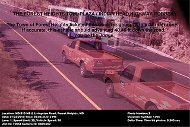




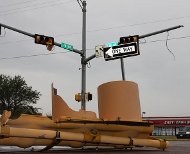






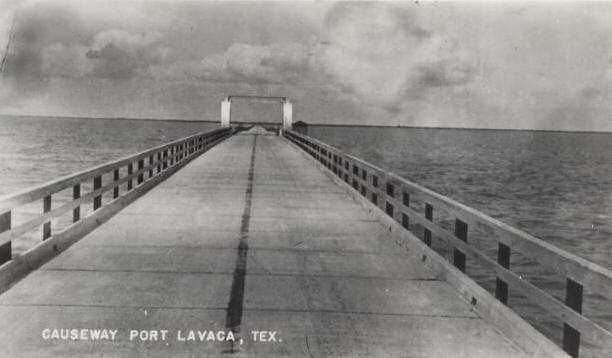
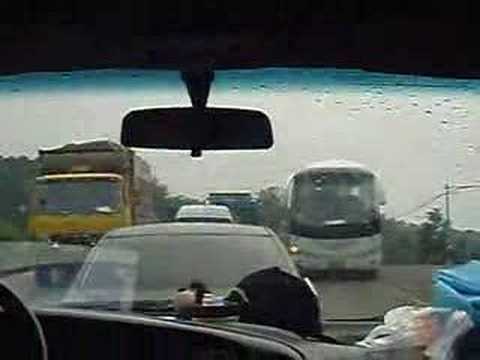


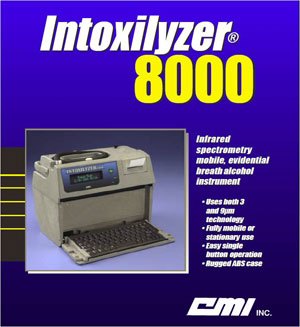


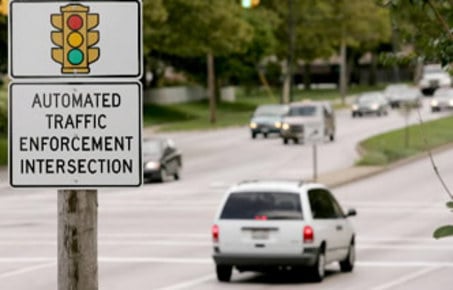



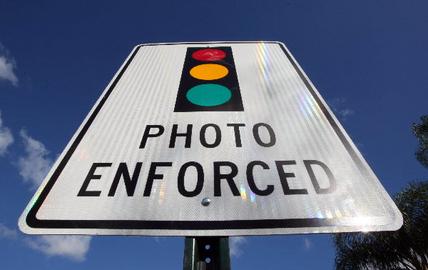

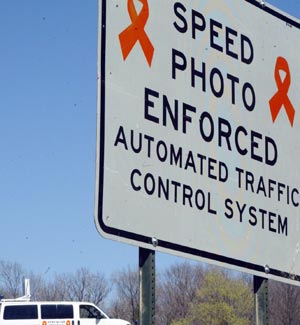


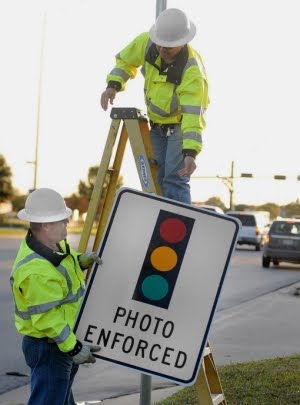
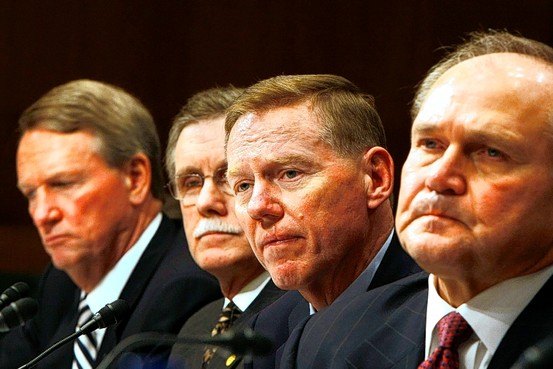



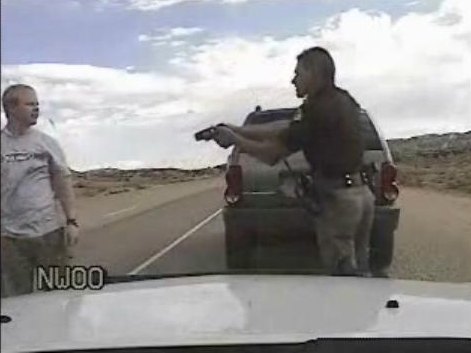

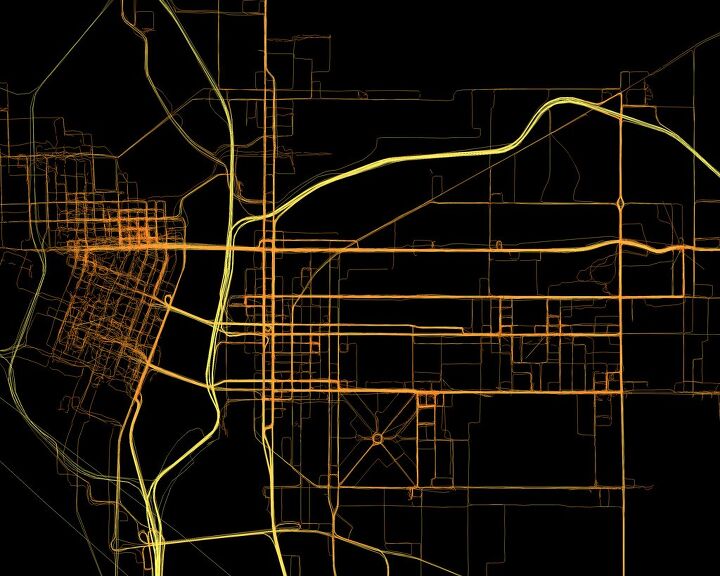

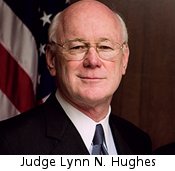





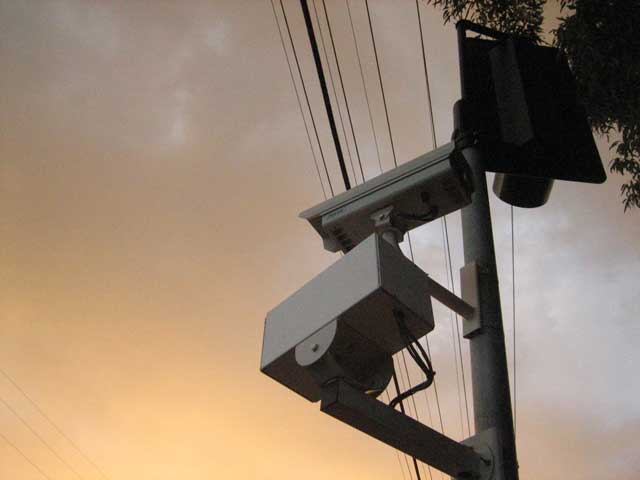


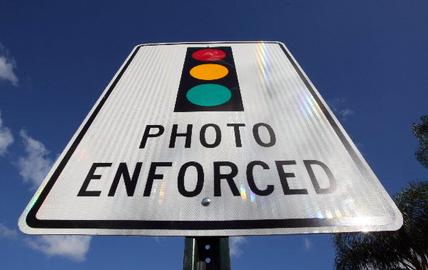

















Recent Comments